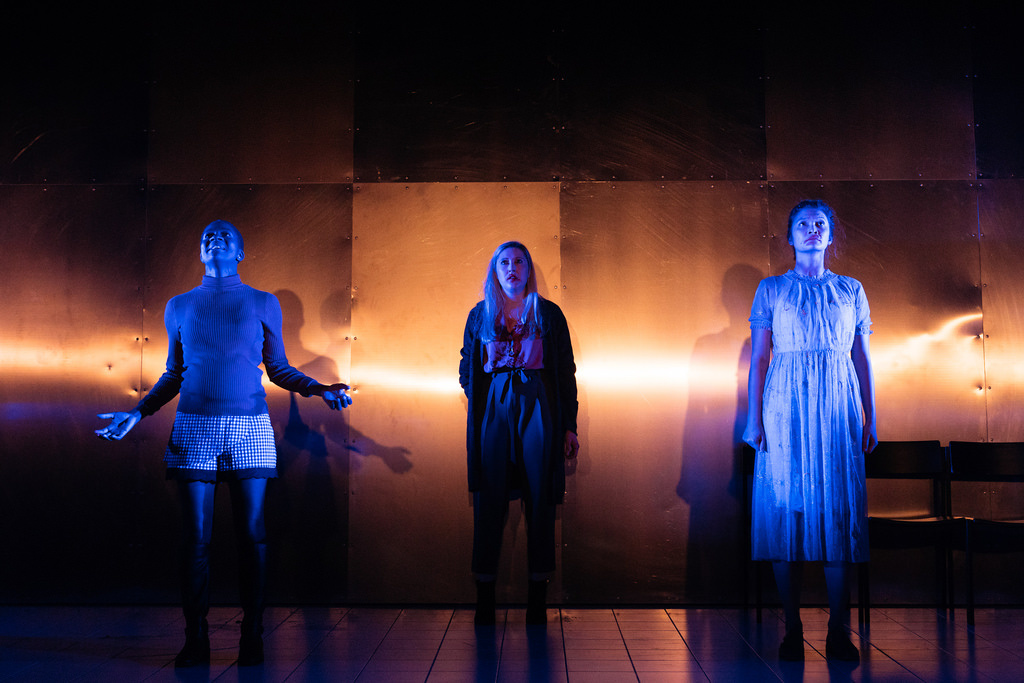Review: OTHELLOMACBETH, Lyric Hammersmith

![]() "But men are men..."
"But men are men..."
Gender is taking centre stage in the current climate, telling her story not history. From new writes like SIX and the Old Vic's Sylvia, to the reframing of classics from a female perspective, the Liverpool Everyman's female-led Othello and the Globe's Imogen prove the relevance of these texts to modern audiences.
Jude Christian and Elayce Ismail's othellomacbeth is a hybrid of these: retelling two of Shakespeare's greatest plays, placing the emphasis on women with new and lifted text. While bold it may be, the result is a mixed bag of "confused events, new hatch'd to [this] woeful time".
Having played HOME at Manchester, the show reopens the recently renovated Lyric Hammersmith. Condensing and combining, othellomacbeth is a call and response of themes across the two plays.
In Othello, we witness the verbal and physical abuse of women and their untimely fates. Untimely in the sense that the traditional narrative comes to an abrupt end, as three female characters meet their ends too. The cast doubles across both shows and as we enter Macbeth, those characters carry their mistreatments through into this new world.
"We must obey the time" is seemingly the mantra of the first half, as the production hurtles through Othello. Scene changes come every minute, flashing from one to the next with harsh lighting, keeping you in a heightened state. Set against Basia Binkowska's metallic backdrop with only a few feet for playing, this makes for an oppressive, almost inescapable sense.
With over 3,500 lines in the original text, huge swathes are unfortunately lost for time. Gone are Iago's famous soliloquies and his gulling of Othello, making the latter's belief in Cassio's affair even less founded and his branding of Desdemona as "whore" the more shocking. One side effect of the pacing in Othello's opening scene is that lines are lost due to quick delivery and poor diction.
This speed is a stark contrast to the petty pace of the second act. As the stage opens up, scenes melt one into the next, the Weird Sisters remaining on stage throughout. Added text features heavily here, as lines from Othello echo and haunt Macbeth.
Emilia's "Yet have we some revenge" rallies the Witches, and Othello's "Of one who loved not wisely, but too well" becomes Lady Macbeth's much-denied death speech. Subtle moments from the first half play out beat for beat, the roles reversed when Iago and Emilia meet again.
When such repetitions don't work though, it's painfully obvious. Dialogue weighs down certain scenes, bringing the narrative to a complete stop. Desdemona's willow song is replaced with Anjana Vasan's "Oh Sister". Starting the show and reappearing throughout, though it attempts to frame the narrative, the repetition of "suicide vest" feels a tad heavy-handed.
Another repeated motif is revenge. The image we are left with at the end of the first half is striking: the three women stand tall and ready for vengeance, receiving a rapturous applause from the audience. However, tracing their journey from here, their motivations and actions become confused.
For the most part, the three watch: passive, not active or affecting change. One of the characters in the second half even suffers a fate similar to that of their first role. As the epilogue indicates (again heavy-handedly), we should learn from the past.
While trying to put the spotlight on women and their power, the cyclical nature of the text struggles against this, constantly in conflict. An interesting conceit, it feels confused in Macbeth. Although as Vasan's song says, "Ain't it always about a man?".
Kirsten Foster's Desdemona speaks up and out. You almost feel like she could change her story and convince Othello of Cassio's innocence. Melissa Johns' Emilia watches scenes unfold with a wry look, while Kezrena James delivers Vasan's song beautifully. The trio's strength shines in their scenes with Macbeth, a protectiveness and sisterhood self-evident.
Despite having most of his lines cut, Samuel Collings still makes for a memorable Iago with his acidity, spitting "villainous whore" to Emilia. Sandy Grierson likewise impresses as the drunken Cassio and devilish Macbeth. Cutting the roles of the murderers, Macbeth has to undertake the deaths himself, Grierson's portrayal cold and yet relishing in these.
Though it may be full of the sound and fury of the female voice, othellomacbeth signifies very little in the current landscape of London theatre.
othellomacbeth at the Lyric Hammersmith until 3 November
Photo credit: Helen Murray
Reader Reviews

Videos

